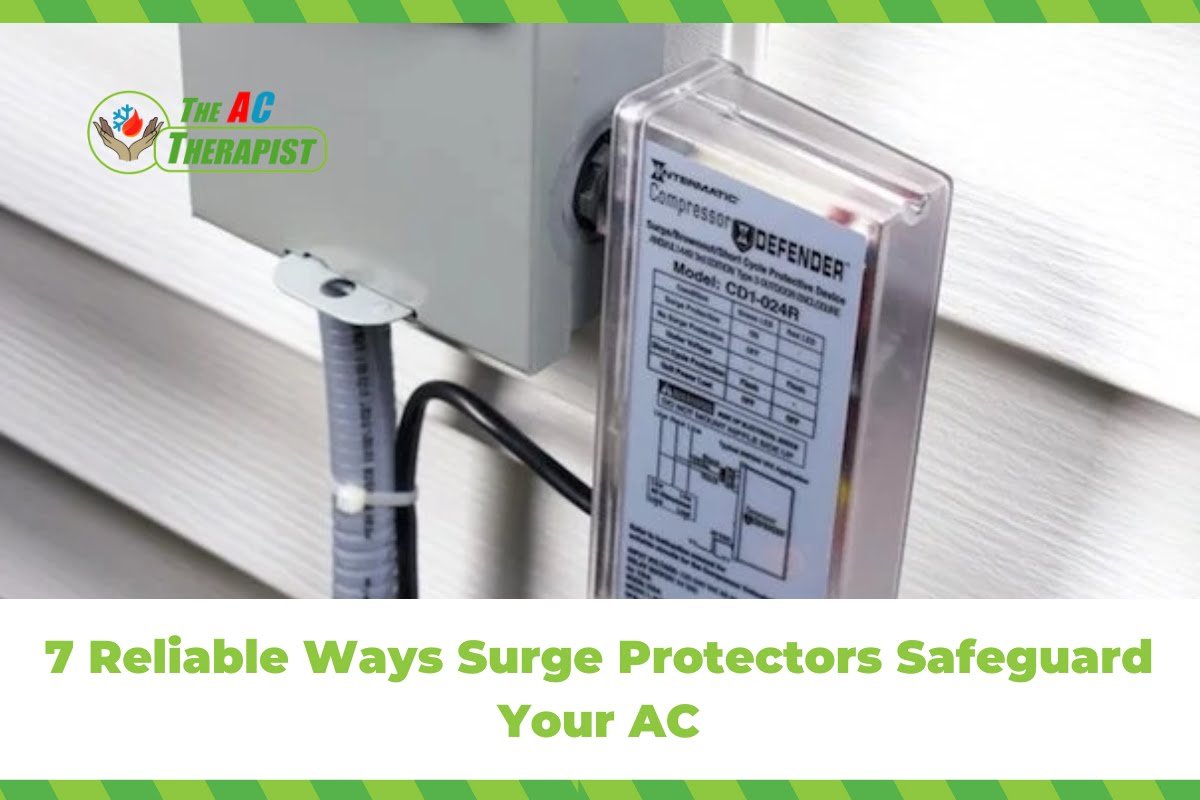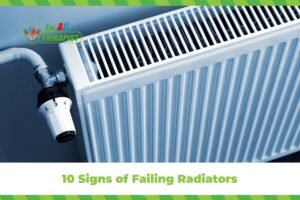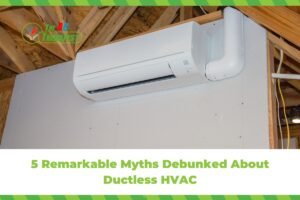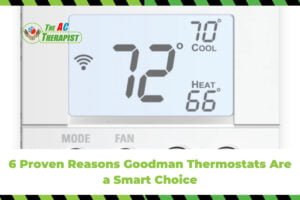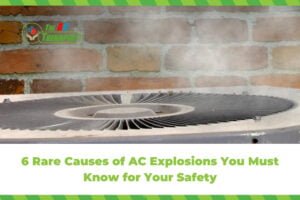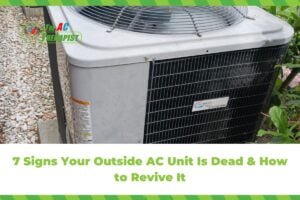7 Reliable Ways Surge Protectors Safeguard Your AC
In the sweltering heat of summer or the unexpected warmth of a spring day, air conditioning isn’t just a luxury; it’s a necessity for maintaining comfort in our homes and workplaces. However, the very system that brings us relief from the heat can be vulnerable to an unseen threat: electrical surges. This comprehensive guide delves into the world of surge protectors, a critical component for safeguarding your air conditioning system.
Electrical surges can strike unexpectedly, stemming from various sources and potentially wreaking havoc on your AC unit. Understanding how to protect your air conditioner from these surges is not just about preserving a piece of equipment; it’s about ensuring uninterrupted comfort and peace of mind. In this blog, we’ll explore what electrical surges are, how surge protectors work, and why every homeowner should consider them an essential part of their AC system.
Understanding Electrical Surges
An electrical surge is a sudden and significant increase in voltage that surpasses the standard flow of electricity in your home. These surges can be brief, but their impact can be severe and long-lasting, especially for sensitive electronics and appliances like air conditioners.
Surges can originate from external sources such as lightning strikes, power outages, or grid switching by utility companies. However, they can also come from within your home. Everyday activities, like operating high-power devices (vacuum cleaners, hairdryers, or even turning on and off large appliances), can generate smaller surges that accumulate over time, causing wear and tear on your electrical systems and connected devices.
For air conditioning systems, which are both power-intensive and contain delicate electronic components, these surges pose a significant risk. They can damage the compressor, control panels, and other critical components, leading to costly repairs or even the need for a complete replacement.
Common Causes of Electrical Surges
Electrical surges can originate from various sources, both external and internal to your home:
- Lightning Strikes: One of the most powerful sources of electrical surges, a lightning strike near a power line can send millions of volts through the grid, potentially causing severe damage to connected appliances.
- Power Outages and Grid Switching: When power is restored after an outage or when utility companies switch grid systems, the sudden return or redirection of electricity flow can cause surges.
- High-Power Electrical Devices: Within your home, devices that require a lot of power to start up or shut down, such as refrigerators, air conditioners, and even elevators in multi-story buildings, can create surges. These internal surges are typically smaller than those caused by lightning but can accumulate over time, causing gradual wear and tear on your electrical systems.
- Faulty Wiring or Problems with the Utility Company’s Equipment: Issues such as damaged power lines, transformers, or other infrastructure problems can also lead to surges.
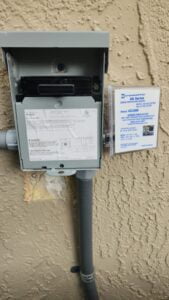
How Surges Can Affect Air Conditioning Systems
Air conditioning units are particularly vulnerable to electrical surges due to their complex electronic components and the significant power they draw. Here’s how a surge can impact an AC system:
- Damage to Electronic Circuit Boards: Modern AC units often have sophisticated circuitry that can be sensitive to power fluctuations. A surge can fry these electronic components, leading to a malfunction or complete breakdown of the system.
- Compressor Damage: The compressor is the heart of your AC unit, and it’s also one of the most surge-sensitive components. A powerful surge can cause immediate compressor failure, necessitating expensive repairs or replacement.
- Capacitor Wear and Tear: Capacitors in your AC unit help start the compressor and the motors that power the fans. Surges can weaken these capacitors over time, reducing their efficiency and lifespan.
- Overall Reduced Lifespan: Repeated exposure to surges, even minor ones, can gradually degrade the internal components of your AC unit, reducing its overall lifespan and efficiency.
The Role of Surge Protectors
Surge protectors play a crucial role in safeguarding electronic devices, including air conditioning units, from the damaging effects of electrical surges. Understanding what surge protectors are and how they function is key to appreciating their importance in home maintenance and appliance protection.
What Surge Protectors Are and How They Work
A surge protector is a device designed to protect electrical appliances from voltage spikes. It does this by controlling the flow of electricity to the appliance and diverting any excess voltage away from it. This process helps prevent damage that can be caused by overvoltage.
The primary mechanism in a surge protector is a component called a Metal Oxide Varistor (MOV). The MOV can divert extra voltage. Under normal operating conditions, it allows the standard voltage to pass through to the AC unit. However, when a surge occurs and the voltage exceeds a safe threshold, the MOV changes its resistance almost instantaneously and redirects the excess voltage to the ground, thus protecting the connected appliance.
Different Types of Surge Protectors
- Whole-House Surge Protectors: These are installed at your home’s electrical panel and provide surge protection for your entire home. They are designed to handle large surges, such as those caused by lightning strikes or major electrical events.
- HVAC Surge Protectors: These are specifically designed for air conditioning systems. They are installed directly at the AC unit and provide dedicated protection against surges that can affect the system’s sensitive components.
- Plug-In Surge Protectors: Commonly used for smaller appliances and electronics, these surge protectors plug into a wall outlet and the appliance plugs into the protector. While useful for many devices, they are generally not sufficient for the high power demands of an AC unit.
The Importance of Surge Protection for AC Units
Air conditioning systems are significant investments and are crucial for comfort, especially in areas like Tampa Bay. The importance of surge protection for these units cannot be overstated:
- Protects Investment: Surge protectors help extend the life of your AC unit by preventing damage from electrical surges, thus protecting your investment.
- Prevents Costly Repairs and Downtime: By avoiding damage from surges, you also avoid the costly repairs and inconvenient downtime that can result from a damaged AC unit.
- Enhances Safety: Electrical surges can potentially cause fire hazards. Surge protectors reduce this risk, enhancing the overall safety of your home.
- Maintains System Efficiency: Consistent performance and efficiency of your AC unit are maintained when it is protected from the erratic impacts of surges.
Benefits of Using Surge Protectors for AC
Incorporating surge protectors into your air conditioning system offers several significant benefits, enhancing not only the performance and lifespan of your AC unit but also providing peace of mind. Here are some key advantages:
- Extended Lifespan of AC Unit: Surge protectors effectively manage unexpected voltage spikes, thereby reducing stress on the AC unit’s internal components. This protection can significantly extend the lifespan of your air conditioner, ensuring it continues to function efficiently for years.
- Prevention of Costly Repairs and Replacements: Without a surge protector, your AC unit is vulnerable to damage from power surges, which can lead to expensive repairs or even the need for a complete replacement. Surge protectors can help you avoid these costs by shielding the sensitive electronics within your AC system.
- Improved Safety: Electrical surges can pose a fire risk, especially if they cause an electrical fault within a high-power appliance like an air conditioner. By mitigating these surges, surge protectors enhance the overall electrical safety of your home.
- Maintained Efficiency: Consistent and uninterrupted operation is key to the efficiency of your AC unit. Surge protectors help maintain this consistency by preventing fluctuations in power that can strain and degrade the system over time.
- Peace of Mind: Knowing that your air conditioning system is protected from sudden electrical surges provides a sense of security and comfort. This is particularly valuable in areas prone to lightning storms or with unstable power grids.
- Cost-Effective Protection: Compared to the potential costs associated with repairing or replacing a damaged AC unit, investing in a surge protector is a cost-effective solution. It’s a small price to pay for the protection and longevity it offers your system.
- Enhanced Resale Value: Homes equipped with comprehensive surge protection, including for major appliances like AC units, can be more appealing to potential buyers, potentially increasing the resale value of your property.
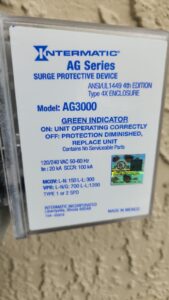
Choosing the Right Surge Protector for Your AC
Selecting the appropriate surge protector for your air conditioning system is crucial to ensure optimal protection. Here are key factors to consider:
- Electrical Ratings: Look for a surge protector with an appropriate joule rating, which indicates the amount of energy it can absorb. A higher joule rating means better protection. Also, consider the clamping voltage (the voltage level at which the protector starts diverting excess energy) and ensure it’s suitable for your AC unit.
- Type of Surge Protector: Decide between a whole-house surge protector, which offers comprehensive protection for your entire electrical system, and an individual HVAC surge protector, designed specifically for your AC unit. In many cases, using both types provides the best protection.
- UL Certification: Ensure the surge protector is certified by Underwriters Laboratories (UL) or another reputable safety certification organization. Look for UL 1449 certification, which is specific to surge protection devices.
- Manufacturer’s Warranty: A good warranty not only indicates the manufacturer’s confidence in their product but also assures potential defects. Some warranties even cover damage to connected equipment.
- Professional Recommendation: Consult with a licensed HVAC professional, like The AC Therapist, for recommendations on the best surge protector for your specific AC model and home setup.
Installation and Maintenance
- Professional Installation: While some surge protectors can be installed by the homeowner, it’s generally recommended to have a professional, especially for whole-house surge protectors or HVAC-specific models. An HVAC professional can ensure proper installation and integration with your existing system.
- Regular Inspections: Have your surge protector inspected regularly, ideally as part of your routine AC maintenance schedule. This ensures it’s functioning correctly and hasn’t been damaged by a previous surge.
- Prompt Replacement: Surge protectors are not designed to last forever. If your protector has taken a significant hit or is showing signs of wear, it should be replaced. Some models have indicator lights to show when they’re no longer providing protection.
- Avoid DIY Repairs: If you suspect your surge protector is malfunctioning, don’t attempt to repair it yourself. Consult a professional to either repair or replace the unit.
- Keep It Clean: Ensure the area around your surge protector is clean and free of dust, which can affect performance. This is particularly important for HVAC surge protectors that are installed outdoors or in dusty environments.
Common Myths and Misconceptions About Surge Protectors
When it comes to surge protection, especially for air conditioning systems, several myths and misconceptions can lead to confusion and improper use. Addressing these can help homeowners make more informed decisions about protecting their AC units.
Myth: Surge Protectors and Power Strips Are the Same
- Misconception: Many people confuse surge protectors with power strips, but they serve different purposes. Power strips simply provide additional outlets, while surge protectors are designed to protect electronics from voltage spikes.
Myth: All Surge Protectors Offer the Same Level of Protection
- Misconception: Surge protectors vary in their specifications, such as joule rating, clamping voltage, and response time. These factors determine the level of protection offered, and different models are suited for different needs and appliances.
Myth: A Surge Protector Is a One-Time Purchase
- Misconception: Surge protectors have a limited lifespan. They degrade over time, especially after absorbing several surges. It’s important to replace them periodically to ensure ongoing protection.
Myth: Surge Protectors Can Stop Lightning Strikes
- Misconception: While surge protectors can mitigate damage from indirect lightning strikes (like a strike to a nearby power line), they cannot protect against a direct strike. Comprehensive home protection often requires a combination of surge protectors and lightning rods.
Myth: Internal Surges Aren’t Damaging
- Misconception: Many people believe that only external surges (like lightning) are harmful. However, internal surges, often caused by large appliances cycling on and off, can also degrade the AC unit over time.
Myth: Surge Protectors Are Only Necessary in Storm-Prone Areas
- Misconception: While areas prone to electrical storms certainly benefit from surge protection, surges can occur anywhere and for various reasons, including grid switching and internal surges. Therefore, surge protection is important regardless of location.
Myth: Surge Protectors Also Improve Power Quality
- Misconception: Surge protectors are designed to protect against voltage spikes, but they do not regulate or improve the overall quality of the power supplied to the AC unit.
Myth: Installing a Surge Protector Is Complicated and Expensive
- Misconception: Many homeowners assume that surge protector installation is a complex and costly process. In reality, installation, especially of individual AC unit protectors, is straightforward and cost-effective, particularly when weighed against the potential costs of surge damage.
7 Reliable Ways Surge Protectors Safeguard Your AC: Ensuring Efficiency and Longevity
As we wrap up our comprehensive guide on the importance of surge protectors for air conditioning systems, we at The AC Therapist want to reinforce the critical role these devices play in the health and efficiency of your AC unit. The seven reliable ways in which surge, protectors, safeguard your AC – from extending its lifespan and preventing costly repairs to enhancing safety, maintaining efficiency, and offering peace of mind – are essential considerations for any homeowner, especially in the Tampa Bay area where air conditioning is not just a comfort but a necessity.
At The AC Therapist, our commitment to your home’s comfort and safety drives us to emphasize the importance of proper AC maintenance, including the use of surge protectors. By choosing the right surge protector, ensuring its correct installation and maintenance, and dispelling common myths, you can significantly enhance the protection and longevity of your AC unit. This proactive approach is not just about safeguarding the intricate components of your air conditioner; it’s about contributing to a stable, comfortable, and secure home environment.
We understand that the investment in a quality surge protector is a small price to pay compared to the potential costs and inconvenience of repairing or replacing a damaged AC system. The peace of mind that comes from knowing your home is equipped to handle unexpected electrical surges is invaluable. In our experience, homes equipped with surge protection experience fewer AC-related issues and enjoy a more consistent performance from their air conditioning systems.
As we continue to embrace advancements in home technology and the increasing dependence on electronic appliances, it’s crucial to not overlook the fundamental aspects of home care. Investing in a surge protector for your air conditioning system, with the expertise and guidance of The AC Therapist, is a wise, forward-thinking decision. It ensures the longevity and efficiency of one of your home’s most vital components.
We encourage you to take this essential step in protecting your comfort, your investment, and your peace of mind. Trust The AC Therapist to provide you with not only the best surge protection solutions but also comprehensive care for your air conditioning system. Let us help you enjoy uninterrupted, efficient performance from your air conditioning system for years to come, ensuring your home remains a haven of comfort regardless of the weather outside.

